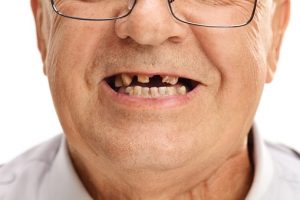 Many of us think that digestion begins the moment the food is swallowed, but really, it starts the moment you put the food in your mouth. When you chew, not only are you beginning the digestive process by making your food smaller, but digestive enzymes are released through your saliva to ease the digestive process. For this reason, your mouth and oral hygiene play a big role in the digestive process.
Many of us think that digestion begins the moment the food is swallowed, but really, it starts the moment you put the food in your mouth. When you chew, not only are you beginning the digestive process by making your food smaller, but digestive enzymes are released through your saliva to ease the digestive process. For this reason, your mouth and oral hygiene play a big role in the digestive process.
As we age, we experience many changes, one being changes to our mouths. When these changes occur, it can disrupt the digestive process, causing digestive problems that we didn’t have years prior.
Advertisement
Here are some ways in which your oral hygiene can negatively affect your digestion.
- Missing teeth can disrupt saliva production because the act of chewing is what produces saliva. As mentioned, saliva holds key digestive enzymes to begin the digestion process, and not enough saliva can lead to indigestion and prevent the proper absorption of nutrients.
- Missing teeth can disrupt a person’s ability to swallow food. Lack of teeth means that food can’t be broken down into smaller pieces which are easier to swallow. This can increase the risk of choking and can lead to indigestion because big food items take longer to break down.
- Chewing food helps relax the lower section of the stomach. This area is known as the pylorus and it allows the food to pass from the stomach to the intestines. When saliva is being produced through chewing, the pylorus becomes relaxed, which allows food to pass through more freely. Missing teeth hinders this process because the food isn’t being chewed and saliva isn’t being produced.
- Missing teeth promotes bacteria growth because food left in bigger pieces are harder to be broken down from the enzymes in saliva. This hinders the foods ability to be broken down through the digestive tract, which means those essential nutrients aren’t being properly absorbed. Furthermore, undigested food becomes food for harmful bacteria.
- If you suffer from gastroesophageal reflux disease (GERD), the acid that comes back up can erode teeth, cause damage to teeth, and eventually require teeth to be removed.
Maintaining proper oral hygiene and your teeth is an integral part of the digestive process. This is why taking regular visits to the dentist and practicing at-home oral hygiene techniques can go a long way in preserving your teeth to reduce your risk of digestive issues.
Also read:
